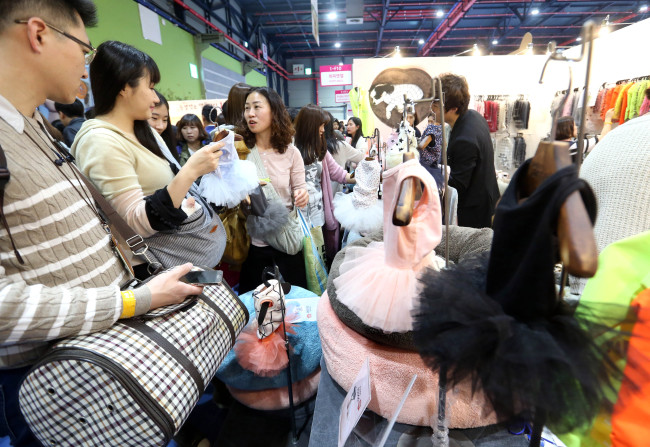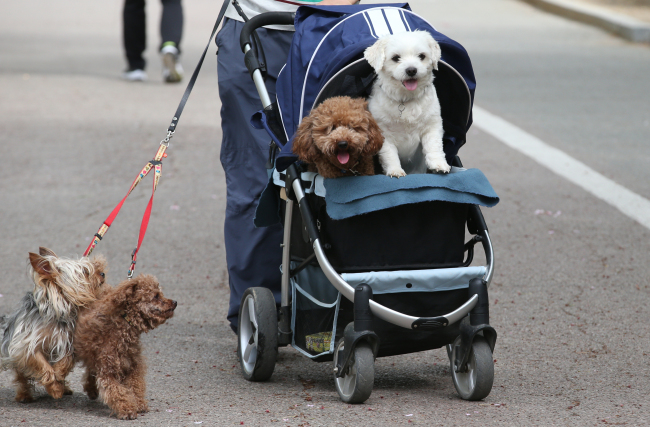Loving dog owners fuel Korea’s pet industry boom
The Korean pet industry is expanding in size and spectrum as pet owners spare no expense for their beloved canine companions
By Sohn Ji-youngPublished : April 27, 2016 - 16:40
Every month, 25-year-old Rebecca Kim spends around 700,000 won ($610), sometimes more or less depending on the circumstance, on her two dogs — Cocoa and Oreo.
The costs include hiring a dog trainer, routine visits to the veterinarian, and purchasing organic dog food and daily necessities. She also pays for pet hotels, as she is often out of town for work, among other fees.
“They’re definitely expensive to take care of and such,” Kim admits. “But in the end, they’re a part of the family and the costs are worth it. They’re living beings who must be cared for and loved,” she said.
Kim is just one of some 10 million or more pet owners in Korea, most of whom own dogs, who increasingly spare no expense in caring for their beloved canine companions.
The costs include hiring a dog trainer, routine visits to the veterinarian, and purchasing organic dog food and daily necessities. She also pays for pet hotels, as she is often out of town for work, among other fees.
“They’re definitely expensive to take care of and such,” Kim admits. “But in the end, they’re a part of the family and the costs are worth it. They’re living beings who must be cared for and loved,” she said.
Kim is just one of some 10 million or more pet owners in Korea, most of whom own dogs, who increasingly spare no expense in caring for their beloved canine companions.

Fueled by the rising number of pet owners, the nation’s pet industry is expanding in scope. It has grown to include specialized medical and aesthetic pet care options, organic pet food, pet insurance, high-end dog clothing and accessories, television channels for dogs and even pet funeral services.
And such businesses will continue to expand. The domestic pet industry - valued at roughly 1.81 trillion won as of last year – is forecast to reach 5.8 trillion won in size by 2020, according to a 2015 report by KB Financial Group Economic Research Institute.
Pushing the boundaries of local pet care services is Irion, a leading animal hospital based in Gangnam-gu, Seoul. It offers not only basic medical services for pets, but also a diversity of premium treatment options that will become more complex and diversified in the coming years.
And such businesses will continue to expand. The domestic pet industry - valued at roughly 1.81 trillion won as of last year – is forecast to reach 5.8 trillion won in size by 2020, according to a 2015 report by KB Financial Group Economic Research Institute.
Pushing the boundaries of local pet care services is Irion, a leading animal hospital based in Gangnam-gu, Seoul. It offers not only basic medical services for pets, but also a diversity of premium treatment options that will become more complex and diversified in the coming years.

Current treatments include stem cell injections — which can cost up to 2 million won — endoscopies, abdominal ultrasounds, platelet-rich plasma injections, cancer treatment, physical therapy and obesity clinics, among others.
“If people in the past visited hospitals mainly to treat sick dogs, they now seek broader preventive medical services such as routine health checkups and regenerative therapy including stem cell injections — all forecast for further future development,” Kim Tae-ho, a veterinarian at Irion, told The Korea Herald.
The hospital also operates a pet day care and hotel. Hotel prices range from 40,000 won to 120,000 won per night, depending on the size and amenities of the rooms such as those which include surveillance cameras.
Owners who seek healthier food for their dogs and cats are also fueling the growth of Korea’s premium pet food market. Sales of handmade pet treats rose by 56 percent from 2013 to 2015, according to Gmarket, Korea’s leading e-commerce firm. General pet food sales also rose by 28 percent over the same period, it said.
With the market growing in size, competition has intensified. Leading foreign brands like Nestle’s Purina and Royal Canin, now compete against local brands such as CJ CheilJedang, Pulmuone and Dongwon F&B which have introduced their own pet food products over the past three years.
“As more people view pets as a part of the family, they spare no expense in providing for their pets, fueling demand for premium dog foods,” said Gmarket spokesperson Kim Sung-hyun.
As for owners seeking unique looks for their pets, there are specialized salons that offer tailor-fit grooming styles and even lavish spa programs, not to mention the abundance of pet clothing and accessories of all sorts sold through online and offline vendors.
Other standout services include Dog TV, a television channel that provides tailored company for dogs left alone at home, pet insurance programs and firms that specialize in dog funerals and cremation services for pet owners.
“The demise of traditional family structures has led animals to become concrete members of the family, who are loyal to their owners. As more people become attached to their dogs, the related industry in turn grows, fueled by new demands,” the Irion veterinarian said
By Sohn Ji-young (jys@heraldcorp.com)
This is the fourth installment in a series of articles that look at Korea’s pet culture and industry. -- Ed.
“If people in the past visited hospitals mainly to treat sick dogs, they now seek broader preventive medical services such as routine health checkups and regenerative therapy including stem cell injections — all forecast for further future development,” Kim Tae-ho, a veterinarian at Irion, told The Korea Herald.
The hospital also operates a pet day care and hotel. Hotel prices range from 40,000 won to 120,000 won per night, depending on the size and amenities of the rooms such as those which include surveillance cameras.
Owners who seek healthier food for their dogs and cats are also fueling the growth of Korea’s premium pet food market. Sales of handmade pet treats rose by 56 percent from 2013 to 2015, according to Gmarket, Korea’s leading e-commerce firm. General pet food sales also rose by 28 percent over the same period, it said.
With the market growing in size, competition has intensified. Leading foreign brands like Nestle’s Purina and Royal Canin, now compete against local brands such as CJ CheilJedang, Pulmuone and Dongwon F&B which have introduced their own pet food products over the past three years.
“As more people view pets as a part of the family, they spare no expense in providing for their pets, fueling demand for premium dog foods,” said Gmarket spokesperson Kim Sung-hyun.
As for owners seeking unique looks for their pets, there are specialized salons that offer tailor-fit grooming styles and even lavish spa programs, not to mention the abundance of pet clothing and accessories of all sorts sold through online and offline vendors.
Other standout services include Dog TV, a television channel that provides tailored company for dogs left alone at home, pet insurance programs and firms that specialize in dog funerals and cremation services for pet owners.
“The demise of traditional family structures has led animals to become concrete members of the family, who are loyal to their owners. As more people become attached to their dogs, the related industry in turn grows, fueled by new demands,” the Irion veterinarian said
By Sohn Ji-young (jys@heraldcorp.com)
This is the fourth installment in a series of articles that look at Korea’s pet culture and industry. -- Ed.


![[Exclusive] Korean military set to ban iPhones over 'security' concerns](http://res.heraldm.com/phpwas/restmb_idxmake.php?idx=644&simg=/content/image/2024/04/23/20240423050599_0.jpg&u=20240423183955)

![[Graphic News] 77% of young Koreans still financially dependent](http://res.heraldm.com/phpwas/restmb_idxmake.php?idx=644&simg=/content/image/2024/04/22/20240422050762_0.gif&u=)



![[Pressure points] Leggings in public: Fashion statement or social faux pas?](http://res.heraldm.com/phpwas/restmb_idxmake.php?idx=644&simg=/content/image/2024/04/23/20240423050669_0.jpg&u=)









